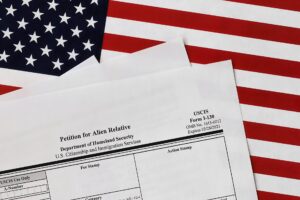Many immigrants dream of the day when they can become a naturalized US citizen. Those who do not have to give up their current citizenship when they pledge allegiance to the American flag will find themselves in the lucky position of holding dual citizenship. A dual citizen is someone who possesses citizenship status in two or more countries. However, while this is an enviable position to occupy, navigating the laws governing dual citizenship for US citizens can be tricky.
Can US Citizens Hold Dual Citizenship?
Many naturalized citizens were born in countries that allow them to hold dual citizenship with the United States. Some of these countries include Brazil, the United Kingdom, Belgium, Portugal, Spain, Mexico, and Australia. Other countries, such as Turkey, South Africa, and Thailand, allow their nationals to become dual citizens, but only with permission.
For naturalized US citizens, holding dual citizenship status brings a number of benefits, such as the ones below:
- Ability to live and work in both countries and to enjoy all the same privileges as other citizens
- Ability to hold passports for both countries and travel between the countries without requiring a visa or any other type of travel document
- Ability to own real estate in both countries without the restrictions often imposed on foreign buyers
- Can hold some political offices in the US and often in the other country of citizenship
- Ability to pursue educational options and career opportunities without immigration restrictions
- Ability to benefit from social services in the US as needed
Additionally, for American athletes lucky enough to qualify for the Olympics, if they are also citizens of another country, they can choose to represent either country in their sport.
Nevertheless, if you are considering becoming a naturalized US citizen, you should be aware that some countries hold strict rules against dual citizenship. These countries include Singapore, Japan, Austria, India, Malaysia, and China. For nationals of these countries, becoming a US citizen will mean being forced to give up their current citizenship. Not only does it make future travel back to these countries more complicated, but having to cut citizenship ties, especially with one’s birth country, can be emotionally impactful and feel like a betrayal of sorts.
What Are the Rules and Implications for Dual Citizens?
Naturalized US citizens hold nearly all the same rights as citizens who were born in the US. The only main difference is that a foreign-born US citizen cannot hold the offices of President or Vice President of the United States. However, if you are fortunate enough to hail from one of those countries that do allow for dual citizenship, there are certain US dual citizenship requirements that you must follow – some of which have been outlined below:
File Annual Taxes
US citizens are required to report all their earnings to the Internal Revenue Service through annual tax filings. For Americans who hold dual citizenship, tax rules may be more intricate. For instance, if you earn income from any other country in a tax year, you must report this income to the IRS. If you move abroad for work after obtaining US citizenship, you will still be required to report your income to the IRS. However, there are some reliefs in place to help US citizens avoid having to pay double taxes on the same income. Before leaving the US, be sure to consult with a tax specialist to learn about these reliefs.
Report for Jury Duty
Citizens who are 18 and over must also report for jury duty whenever they are called to do so. Having dual citizenship does not relieve you of the obligation to serve on a US jury. However, if you do live abroad at any point after becoming a US citizen, you will no longer meet the residency requirements to serve on US juries.
Register for Military Service
When it comes to rules regarding military service, there is no difference between citizens who were born in the US or those born abroad. US citizens – even those in the US who hold dual citizenship – can join any branch of the military if they meet the specific requirements. Additionally, all male citizens between 18 and 25 must register with the Selective Service System in the US. The only issue to bear in mind is that foreign-born US citizens may come from countries that require their citizens to engage in compulsory military service. Some of these countries include Turkey, Brazil, Iran, South Korea, and Israel – although the compulsory service rules have limitations based on sex and age, and there are usually some exemptions or flexibilities for their citizens living abroad.
Respect the Laws of Both Countries
As the saying goes, “When in Rome, do as the Romans do.” This is because sometimes what is perfectly legal in one country may land someone in serious trouble in another. Because of this, if you are in the US and you hold dual citizenship, you should follow the general laws that apply to all citizens. Consequently, when you are in your other country of citizenship, it is also best to follow the laws that govern all citizens there. For example, many people have found themselves in trouble for breaking a minor law in the US that would barely raise an eyebrow in their birth country. Also, bear in mind that some of those laws related to their citizens extend well beyond a country’s borders.
What Happens if You Break the Rules?
While Americans who hold dual citizenship get to enjoy the benefits that all US citizens enjoy, they are also subject to the same penalties for breaking US laws as other citizens. It is vital to follow all the rules that govern everyone living within the US. For most offenses, you would not lose your citizenship status. That level of punishment is only reserved for those who break serious rules governing US citizenship. In fact, there are very few offenses that could cause someone to lose their citizenship. For dual citizens, serving in the military of another country can be one of those ways – if that country is at war with the US. You could also lose your citizenship status in the US if it is discovered that you misrepresented yourself to gain status, such as using fraudulent documents.
So, if you’re wondering, are US citizens allowed to have dual citizenship? And if so, what are the dual citizenship requirements in the US? Then, consulting with a knowledgeable immigration attorney can make your journey to becoming a bona fide citizen of the United States much smoother. At USILC, we have helped many immigrants to realize this dream and to understand the rules and implications of holding dual citizenship for US citizens.




